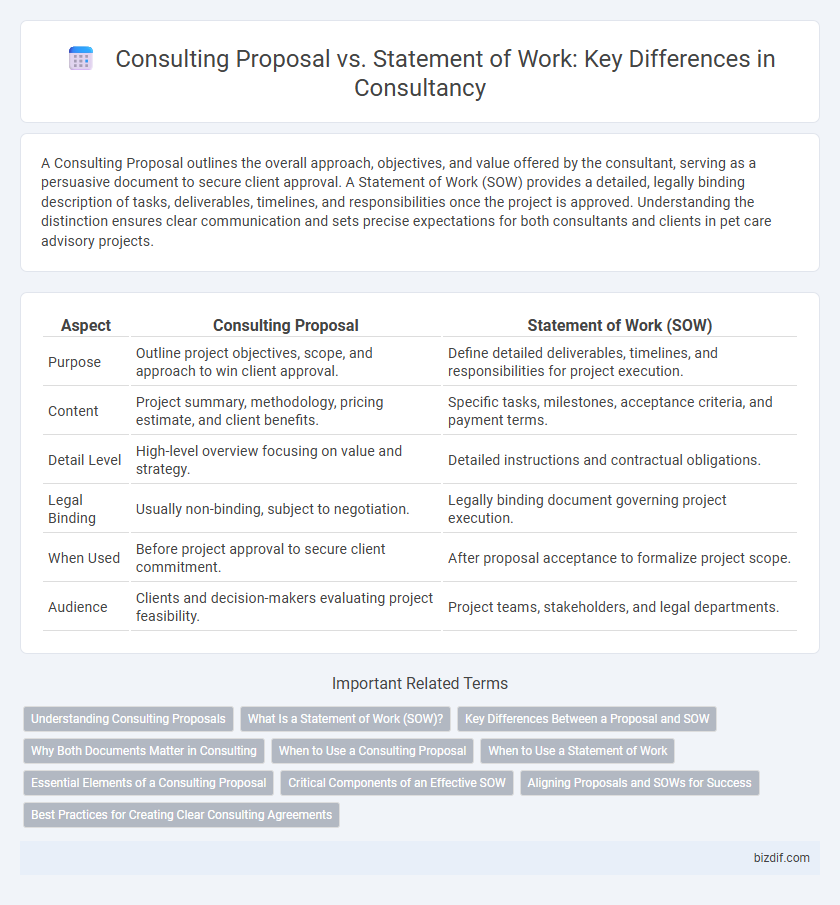A Consulting Proposal outlines the overall approach, objectives, and value offered by the consultant, serving as a persuasive document to secure client approval. A Statement of Work (SOW) provides a detailed, legally binding description of tasks, deliverables, timelines, and responsibilities once the project is approved. Understanding the distinction ensures clear communication and sets precise expectations for both consultants and clients in pet care advisory projects.
Table of Comparison
| Aspect | Consulting Proposal | Statement of Work (SOW) |
|---|---|---|
| Purpose | Outline project objectives, scope, and approach to win client approval. | Define detailed deliverables, timelines, and responsibilities for project execution. |
| Content | Project summary, methodology, pricing estimate, and client benefits. | Specific tasks, milestones, acceptance criteria, and payment terms. |
| Detail Level | High-level overview focusing on value and strategy. | Detailed instructions and contractual obligations. |
| Legal Binding | Usually non-binding, subject to negotiation. | Legally binding document governing project execution. |
| When Used | Before project approval to secure client commitment. | After proposal acceptance to formalize project scope. |
| Audience | Clients and decision-makers evaluating project feasibility. | Project teams, stakeholders, and legal departments. |
Understanding Consulting Proposals
Consulting proposals outline the project scope, objectives, deliverables, and pricing to secure client approval, serving as a persuasive document that sets the foundation for engagement. They emphasize the consultant's approach, expertise, and value proposition tailored to the client's needs, often including timelines and expected outcomes. Understanding consulting proposals is essential for clearly communicating the project vision and obtaining formal agreement before drafting the more detailed Statement of Work.
What Is a Statement of Work (SOW)?
A Statement of Work (SOW) is a detailed document that defines project-specific activities, deliverables, timelines, and expectations between a consultant and client. It outlines the scope, responsibilities, milestones, and performance criteria to ensure clear understanding and agreement. Unlike a consulting proposal, which introduces the service offering and pricing, the SOW serves as a formal contract that governs project execution and accountability.
Key Differences Between a Proposal and SOW
A consulting proposal outlines the project scope, objectives, methodology, timeline, and estimated costs, serving as a preliminary offer to secure client approval. A Statement of Work (SOW) provides detailed descriptions of deliverables, specific tasks, responsibilities, performance standards, and contractual terms once the proposal is accepted. The key difference between a proposal and SOW lies in their purpose: the proposal initiates project discussions and client buy-in, while the SOW formalizes commitments and operational execution.
Why Both Documents Matter in Consulting
A consulting proposal outlines the project scope, objectives, and estimated costs, serving as a persuasive document to secure client approval. The statement of work (SOW) provides detailed, actionable tasks, timelines, and deliverables, establishing clear expectations and contractual terms. Utilizing both documents ensures alignment between consultant and client, reduces risks, and fosters successful project execution in the consulting industry.
When to Use a Consulting Proposal
A consulting proposal is used at the initial stage of engaging with a potential client to outline project goals, deliverables, timelines, and costs, aiming to secure the contract. It serves as a persuasive document that highlights the consultant's expertise and tailored solutions to address the client's business challenges. Consulting proposals are ideal during the pitching phase, before formal agreements like a Statement of Work are established.
When to Use a Statement of Work
A Statement of Work (SOW) is essential when a consulting project requires detailed deliverables, timelines, and specific client expectations to ensure clarity and accountability. Use a SOW for complex projects involving multiple phases or milestones where precise scope and resources must be outlined. This document provides a legally binding framework that minimizes scope creep and aligns both parties on performance metrics and project outcomes.
Essential Elements of a Consulting Proposal
A consulting proposal outlines the project's objectives, scope, deliverables, timeline, and pricing, serving as a persuasive document to win client approval. Essential elements include a clear understanding of client needs, a detailed methodology, resource allocation, and expected outcomes to establish mutual expectations. Unlike a Statement of Work, which formalizes contractual obligations, the consulting proposal focuses on strategic alignment and project justification.
Critical Components of an Effective SOW
An effective Statement of Work (SOW) clearly defines project scope, deliverables, timelines, and client responsibilities to ensure mutual understanding and prevent scope creep. It includes detailed acceptance criteria, performance standards, and payment terms to establish accountability and measure success. Clear communication of assumptions, milestones, and risk management strategies enhances project transparency and facilitates smooth execution.
Aligning Proposals and SOWs for Success
Aligning consulting proposals and Statements of Work (SOWs) enhances project clarity and client expectations by ensuring that objectives, deliverables, timelines, and responsibilities are consistently defined. Precision in both documents minimizes scope creep and facilitates effective resource allocation, fostering mutual accountability between consulting firms and clients. Leveraging detailed, outcome-focused language in proposals and SOWs drives successful project execution and ensures measurable value delivery.
Best Practices for Creating Clear Consulting Agreements
Consulting proposals outline project objectives, scope, and estimated costs, serving as initial agreements to ensure client alignment. Statements of Work (SOW) provide detailed descriptions of deliverables, timelines, responsibilities, and payment terms, forming legally binding contracts that minimize misunderstandings. Best practices for clear consulting agreements include precise language, well-defined scope boundaries, and explicit performance metrics to facilitate transparency and accountability.
Consulting Proposal vs Statement of Work Infographic

 bizdif.com
bizdif.com